Tasting ALL TYPES of Sake With Seminar
In Tokyo, sake enthusiasts can embark on a guided journey to explore the world of Japanese rice wine. A knowledgeable sommelier leads participants through a tasting of 6-7 distinct sake types, explaining characteristics, food pairings, and label decoding. The seminar provides a comprehensive understanding of sake, covering its history, cultural significance, and brewing methods. With a small group size, participants receive personalized guidance, fostering a deeper appreciation for this traditional Japanese beverage. As they navigate the world of sake, they’ll uncover the nuances of Kimoto, Yamahai, and Ginjo, and discover the perfect pairings to elevate their experience, and there’s more to uncover about this ancient Japanese drink.
Just The Basics
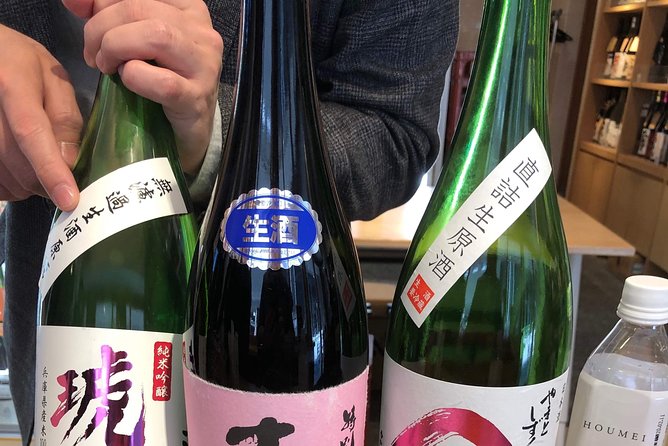
• Participants taste 6-7 distinct types of sake, exploring their unique characteristics, brewing methods, and flavor profiles.
• A knowledgeable sommelier guides the seminar, providing expert insights into the world of Japanese rice wine.
• The session covers the history and cultural significance of sake, as well as the best ways to drink and pair it with food.
• Participants learn how to decode sake labels and receive valuable tips from the sommelier on perfect pairings.
• A comprehensive pamphlet outlines various aspects of sake, ensuring a comprehensive understanding of this traditional Japanese beverage.
It's also worth checking out some other tours and experiences nearby.
Sake Tasting Experience Overview
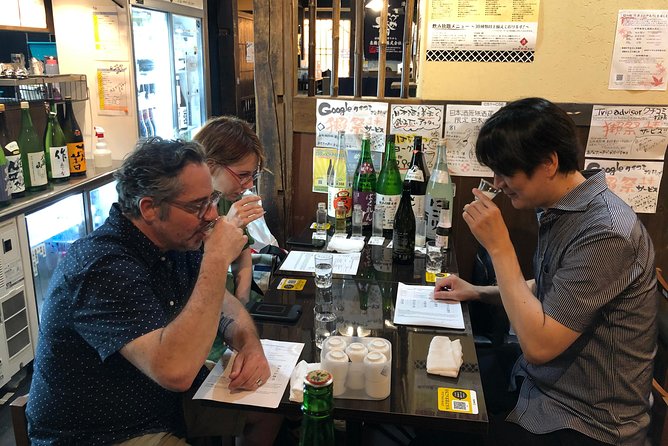
In this unique sake tasting experience, participants embark on a guided journey to explore the world of Japanese rice wine, sampling 6-7 distinct types of sake alongside a knowledgeable sommelier in Tokyo.
This hassle-free experience allows participants to explore the world of sake, eliminating language barriers and boosting their knowledge.
The session includes trying various types of sake, learning the best way to drink them, and discovering the perfect food pairings.
Participants will also gain insight into decoding sake labels and receive valuable tips from the sommelier.
With a small group size, this intimate experience provides a personalized and interactive journey into the world of Japanese rice wine.
What to Expect From Session
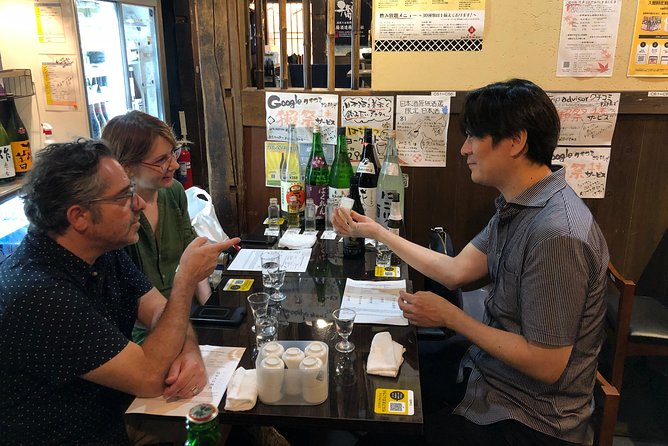
During this informative session, participants can expect to explore the world of sake with a knowledgeable sommelier, exploring the best ways to drink and pair various types of sake.
With a small group size, the experience is intimate and interactive, allowing for a more personalized learning environment.
The sommelier will guide participants through a tasting of 6-7 different types of sake, explaining the characteristics of each and providing top tips on how to decode a sake label.
Participants can ask questions and learn about the best foods to pair with sake, receiving a comprehensive pamphlet outlining various aspects of sake.
Meeting and Logistics Details
Meeting point instructions are clearly outlined to ensure a hassle-free experience, with participants required to gather at Exit B2, across from ISETAN, on the ground level at 3-chōme-4-8 Shinjuku, Shinjuku City, Tokyo 160-0022, Japan.
To ensure a smooth experience, participants should note the following:
-
Confirmation will be received at the time of booking.
-
The meeting point is also the end point.
-
Please note that the tour isn’t wheelchair accessible.
Reviews and Cancellation Policies
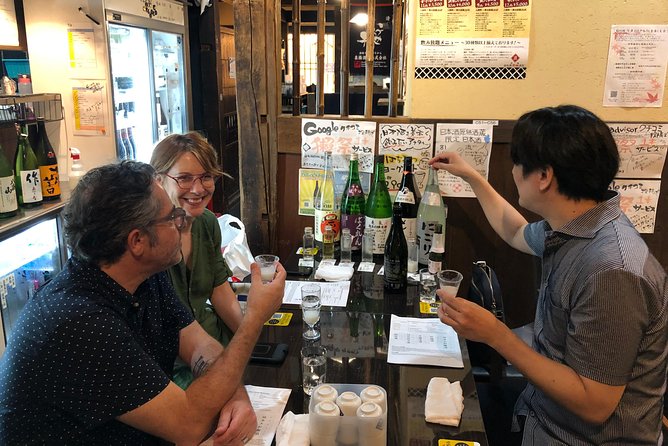
This sake tasting tour has earned a perfect 5.0 rating based on 127 reviews, indicating a highly satisfactory experience for participants.
The tour’s impressive rating is a testament to its exceptional quality and value.
However, it’s essential to be aware of the cancellation policies before booking.
If you need to cancel, you can do so up to 24 hours before the experience and receive a full refund.
Any cancellations made less than 24 hours before the experience won’t be eligible for a refund.
Plus, any changes made less than 24 hours before the experience won’t be accepted.
Be sure to plan accordingly and review the policies carefully to avoid any issues.
Sake Knowledge and History
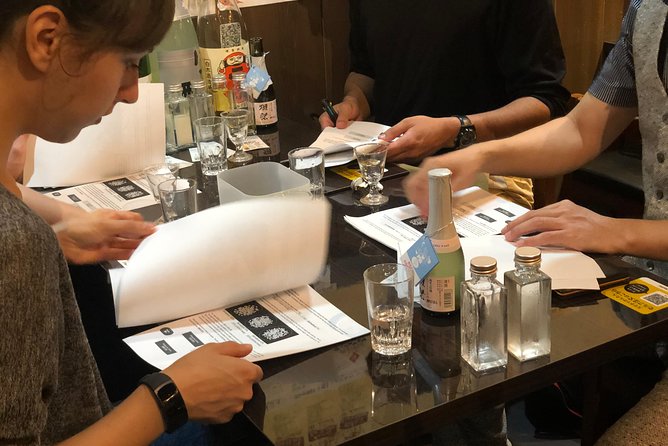
With a deeper understanding of the tour’s logistics and policies, participants can now enjoy the rich history and cultural significance of sake.
This traditional Japanese beverage has a storied past, with records of sake production dating back to the 3rd century. The seminar provides a comprehensive understanding of sake, covering its history, cultural significance, and norms of drinking.
Ancient origins: Sake production dates back to the 3rd century, with evidence of sake breweries in ancient Japan.
Cultural significance: Sake plays a significant role in Japanese culture, often served at special occasions and ceremonies.
Traditional brewing: Traditional sake brewing techniques have been passed down through generations, with many breweries still using ancient methods today.
Tasting Various Sake Types
During the sake tasting session, you will explore a diverse range of sake types, each with its unique characteristics, brewing methods, and flavor profiles.
From classic Junmai to premium Daiginjo, each sake type offers a distinct experience.
Participants will explore the nuances of Kimoto, Yamahai, and Ginjo, learning about their production processes and flavor profiles.
With the guidance of a sommelier, they’ll discover the differences between sparkling, cloudy, and filtered sakes.
By sampling 6-7 types of sake, you will gain a deeper understanding of this ancient Japanese beverage.
This immersive tasting experience will equip them with the knowledge to navigate sake menus and make informed choices.
Seminar and Guided Experience
Under the guidance of a knowledgeable sommelier, participants engage in an informative seminar that delves into the world of sake, uncovering its rich history, cultural significance, and nuances of production. This comprehensive seminar provides a deep understanding of sake, dispelling any misconceptions and fostering a newfound appreciation for this traditional Japanese beverage.
-
Sake’s rich history: Learn about the origins and evolution of sake, from ancient Japan to modern times.
-
Cultural significance: Discover the importance of sake in Japanese culture, including its role in ceremonies and social gatherings.
-
Production nuances: Gain insight into the intricate process of sake production, from rice cultivation to fermentation techniques.
Enhancing the Sake Tasting
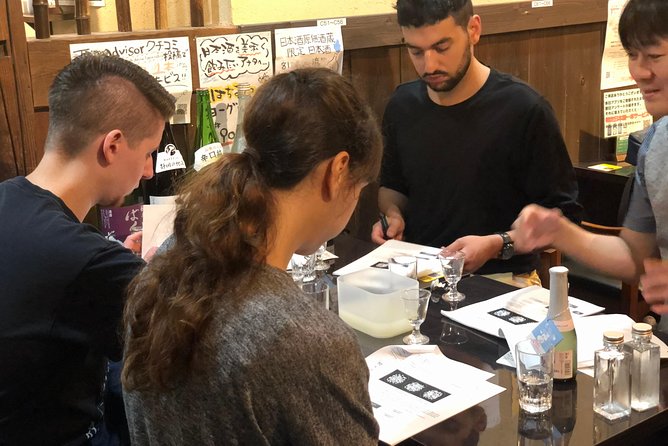
The sommelier’s expert guidance extends beyond the seminar, as participants explore the art of sake tasting, learning how to decode labels, and pairing sakes with complementary foods to elevate the overall experience.
By understanding the nuances of sake labels, participants can make informed choices when selecting a sake.
The sommelier shares tips on how to identify the perfect pairing, balancing the delicate flavors of sake with complementary foods.
This enhanced knowledge enables participants to fully appreciate the complexities of sake, taking their tasting experience to the next level.
With their newfound expertise, participants can confidently explore the world of sake, discovering new favorites and expanding their palate.
Here's a few more nearby tours and experiences we think you'll like.
- 3 Hours Photography and Food Tour in Setagaya
- 1 Day Bus Tour To Mitsumine Shrine From Shinjuku
- Bunraku Performance In Kita-Senju Tokyo
- Tokyo Tour With Guided Interpreter Tokyo/Yokohama ⇒ Tokyo 8 Hours up to 18 People Private Bus Use
- Tokyo Narita Airport (NRT) to Hakone – Private Arrival Transfer
- 4-Days Private MT Fuji Tokyo Kamakura Nikko Hakone Yokohama Tour
Frequently Asked Questions
Can I Purchase Sake at the Tasting Location?
She can’t purchase sake at the tasting location, as the session focuses on education and tasting, not sales; however, she can ask the sommelier for recommendations on where to buy sake in Tokyo.
Are There Non-Alcoholic Options Available for Non-Drinkers?
She notes that the tour operator doesn’t explicitly mention non-alcoholic options, implying they might not be available; however, it’s best to confirm with the operator directly to accommodate non-drinkers’ needs.
Can I Bring a Friend Who Doesn’t Drink Sake?
She can bring a friend who doesn’t drink sake, but it’s essential to consider if the non-sake drinker will still enjoy the experience, as the tour primarily focuses on sake tastings and education.
Are There Other Language Options for the Seminar?
She wonders if there are other language options for the seminar. Unfortunately, the tour operator doesn’t explicitly mention alternative languages, implying that the seminar is likely only available in English.
Can I Request a Private Sake Tasting for a Large Group?
She can request a private sake tasting for a large group by contacting the tour operator, Viator, directly to inquire about customized arrangements, which may require a special quote and tailored experience.
Not for you? Here's more of our most recent tour reviews happening neaby
- Shibuya Anime and Manga Tour With Ramen Lunch
- Shibuya Hidden Street Eats: Japanese BBQ, Fried Chicken, & More!
- Kitchenware Shopping and Cooking Experience in Kappabashi
- Private Shopping Tour From Tokyo to Mitsui Outlet Park Makuhari
- Samurai Experience (with Costume Wearing)
- Tokyo: Samurai Experience and Show
- Tsukiji Old and New – Fish Market Food & Hamarikyu or Skyview
- Private Shopping Tour From Tokyo City to Lake Town Outlet
- A Typical Evening in Shinjuku
- Tokyo Kimono Experience @Japanese-Style Studio Near by Happo-En
- Izakaya Private Hopping Tour in Kamata
- Explore Nikko Toshogu Shrine and Edo Wonderland
- Private Trekking Experience up to 7th Station in Mt. Fuji
- Private Transfer: Tokyo to Haneda Airport HND in Luxury Car
- Morning Discount! Shuttle Van Transfer, Tokyo⇒Haneda, Narita, TDL
Final Words
This sake tasting experience offers a unique and immersive journey into Japan’s national brew.
With a sommelier’s expert guidance, participants explore the intricacies of sake production, cultural significance, and pairing norms.
The 150-minute seminar provides an unparalleled opportunity to taste 6-7 premium sakes, exploring varieties and nuances.
By the end, attendees will leave with enhanced knowledge and appreciation for this ancient Japanese tradition.
